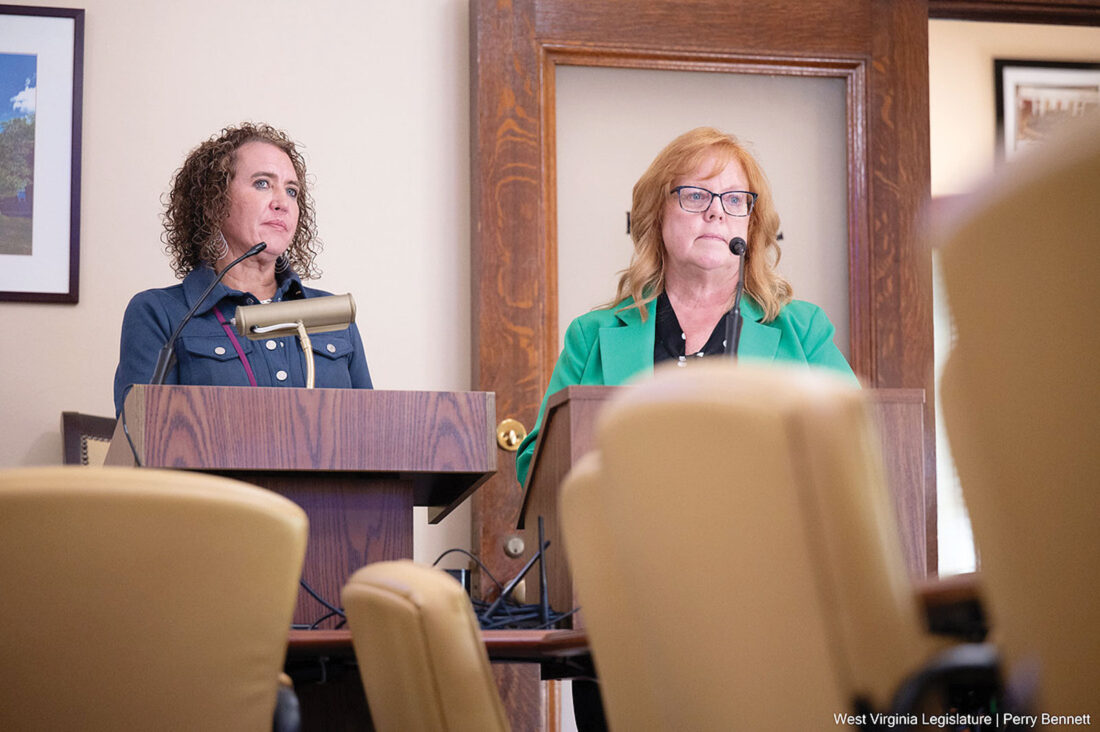Learning Curve: West Virginia lawmakers discuss homeschool online portal

House Educational Choice Subcommittee Chairwoman Kathie Hess Crouse, left, and Deputy State Superintendent of Schools Sonya White, right, have been having conversations on a new homeschool parent online portal and draft legislation creating an Office of School Choice. (Photo courtesy of WV Legislative Photography)
CHARLESTON — The chairwoman of a West Virginia House of Delegates subcommittee is working with the state Department of Education on a centralized online portal for homeschool parents and an office dedicated to answering questions about school choice. The House Educational Choice Subcommittee met Monday afternoon during October legislative interim meetings at the State Capitol Building. The subcommittee heard from Deputy State Superintendent of Schools Sonya White, who briefed lawmakers on the development of a new parent portal application by the West Virginia Department of Education, intended to streamline the process for homeschool applications and other educational transactions. The portal is based on House Bill 3422, which would have required the state Board of Education to design, test and deploy an internet-based reporting system for homeschool families. That bill passed the House of Delegates during the 2025 legislative session earlier this year in a 62-35 vote. While the bill was recommended for passage by the state Senate Education Committee, it was never taken up by the Senate Finance Committee. Despite the failure of the bill, House Educational Choice Subcommittee Chairwoman Kathie Hess Crouse, R-Putnam, has been working with the Department of Education, which began developing its own homeschool parent portal. Crouse said the portal is an offshoot of legislation requiring counties to have an email address that homeschool families can directly send communications to county school officials. “We need to move into this century…Looking at a portal was the next step,” Crouse said after Monday’s meeting. “Because we also found…the county boards were dropping the ball, and students were getting lost.” Speaking to subcommittee members, White said the homeschool portal should be ready by the end of October for initial review and testing. The portal is being developed by the Department of Education in-house and will cost taxpayers no additional money to operate. The department is also redesigning the notice that homeschool families submit to county school officials to be compatible with the new portal. “After this work is complete, the site will offer a parent registration component (and) a teacher registration component for those teachers who review portfolios,” White said. “The portal will also have a notice of intent entry, a notice of termination or completion entry for parents, notifications to counties, notification to parents entering progress determinations, and reports for counties and parents.” With the Hope Scholarship educational voucher program opening up to all eligible students, including private and homeschool students, after fiscal year 2027 next July, phase two of the homeschool portal could include a way to connect Hope Scholarship applications with applications for new homeschool students. But questions arose over the part of the portal dealing with the required annual assessments. State Code requires homeschool students to either take a nationally recognized standardized achievement test or arrange with a county school system to take the same test the public school students are given. But students can also submit a portfolio of their work that can be reviewed by a certified teacher, who can then provide a written narrative about the student’s academic progress. Certified teachers would be able to register to participate as portfolio reviewers on the homeschool portal. Parents would then be able to search for a teacher to review their homeschool student’s work. “The certified teacher is required to review the portfolio, so if they’re a certified teacher and they make that arrangement, the parent has to make that arrangement with the certified teacher in order to make that review possible,” said Assistant Superintendent Timothy Conzett with the Department of Education’s Division of Data Management and Information Systems. House Education Committee Vice Chairman Joe Statler, R-Monongalia, questioned whether the anyone was checking the work of the certified teachers who would be reviewing student portfolios to ensure students were not being given a thumbs up on the five required subject areas – reading, English language arts, science, social studies, and math – if those students were not performing at minimal standards. “I guess I’m asking, is there any standards of anybody that checks these portfolios to make sure that they are doing an appropriate job and just not accepting anything that’s handed before them,” Statler asked. “I just want to make sure that there’s no one out there that’s not going about the system the correct way; whose just out there finding somebody that is a certified teacher that’s maybe looking at the portfolio and maybe not looking at it and give them the answer that they want to allow to continue to do that.” White also briefed lawmakers on the progress of draft legislation to require the state superintendent of schools to create an Office of School Choice to assist students and parents participating in school choice options. “We would have a manager and four program assistants who would be assigned to four geographic regions of the state, so that each of our quadrants would have someone to work with those specific counties,” White said. According to White, the office would offer information on public charter schools, statewide virtual charter schools, private and parochial schools, homeschooling, the Hope Scholarship, microschools, learning pods, and other school choice options. An estimated annual cost for the new office would be approximately $500,000. Crouse said she has been involved with discussions with the department on the creation of a School Choice Office, though she is rethinking whether such an office should be under the department or separate. “My vision for it may be a little different than the state board’s vision for it, but it’s basically to give parents a place to go to ask questions and get the truthful answers on school choice,” Crouse said. “It’s something that I want to look further into, so I don’t know where the School Choice Office will go yet.” Crouse cited comments made last week by state Board of Education President Paul Hardesty accusing the Legislature of keeping the hands of county boards of education tied while expending time and resources on school choice options. “My preference would be not to put an under the board because just from President Hardesty’s words this past week. I don’t see the support there for school choice,” Crouse said. “I want to be able to send parents someplace that I know they will get correct, unbiased information.” Steven Allen Adams can be reached at sadams@newsandsentinel.com.





